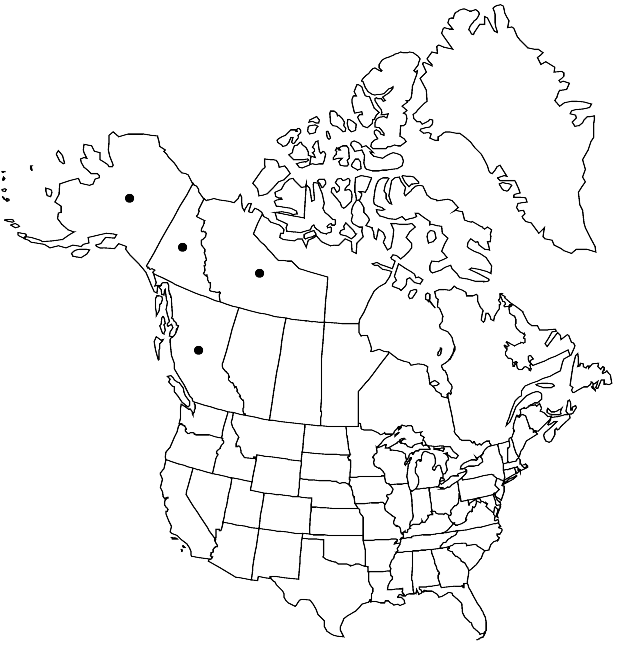Parrya nudicaulis
Bull. Soc. Imp. Naturalistes Moscou 34: 176. 1861.
Plants often not cespitose, caudex branched; glandular throughout or eglandular. Stems (0.4–) 0.7–2.7 (–3.5) dm. Leaves: petiole (0.7–) 1.5–7 (–10) cm, to 5 mm wide at base (glandular or not); blade narrowly spatulate or oblanceolate to lanceolate or oblong, (1–) 1.7–7 cm × (6–) 10–23 (–28) mm, base cuneate or attenuate, margins entire or minutely to coarsely dentate, or sometimes incised, apex acute. Racemes 3–20-flowered. Fruiting pedicels (proximalmost) (10–) 15–40 (–60) mm (glandular or not). Flowers: sepals oblong, 5–8 × 1.5–3 mm (glandular or not); petals lavender to white, purple, (14–) 16–20 (–22) × 7–10 (–12) mm, claw 6–10 mm, apex emarginate; median filaments 6–10 mm; anthers 1.5–2.5 mm. Fruits narrowly oblong to linear-lanceolate, (2–) 3–4 (–4.7) cm × (3.5–) 5–7 mm; valves glandular or eglandular; ovules 12–16 per ovary; style (0.5–) 1–2.5 (–3.5) mm. Seeds 3.5–6 × 3–5 mm; wing 0.7–1.5 mm wide. 2n = 14, 28.
Phenology: Flowering early Jun-early Aug.
Habitat: Tundra, alpine stream valleys, flats and flood banks, limestone or schist mountain slopes and tops, grassy summits, disturbed gravel, moist open areas, meadows, sandy shores, mossy carpets, hillsides, alpine stony slopes, stable sand ridges, turfy snow flushes
Elevation: 0-1800 m
Distribution

B.C., N.W.T., Yukon, Alaska, e Asia (Russian Far East)
Discussion
Parrya nudicaulis is the most variable species in the genus, especially in leaf shape, size, and margin, as well as in the presence versus absence of the extrafloral glands. Much of the confusion about its limits resulted from different emphases on various characters. For example, E. Hultén (1971), who recognized six subspecies, expanded the range of P. nudicaulis to extend from the Canadian arctic and Alaska into the Russian Far East, Siberia, Central Asia, China, and the Himalayas. Three of his four North American subspecies, sometimes growing together, are rather poorly defined morphologically and appear to have been based primarily on the degree of development of leaf teeth. By contrast, R. C. Rollins (1993) recognized a single polymorphic species that included the Utah-Wyoming endemic P. rydbergii. Within a given population of P. nudicaulis, one finds both glandular and eglandular plants with leaf margins entire or variously dentate. In my opinion, these variables alone are unreliable, and flower size, in combination with other characters, can give a better indication of taxon identity.
Selected References
None.
Lower Taxa
"elongated" is not a number."thick" is not a number."dm" is not declared as a valid unit of measurement for this property."dm" is not declared as a valid unit of measurement for this property.